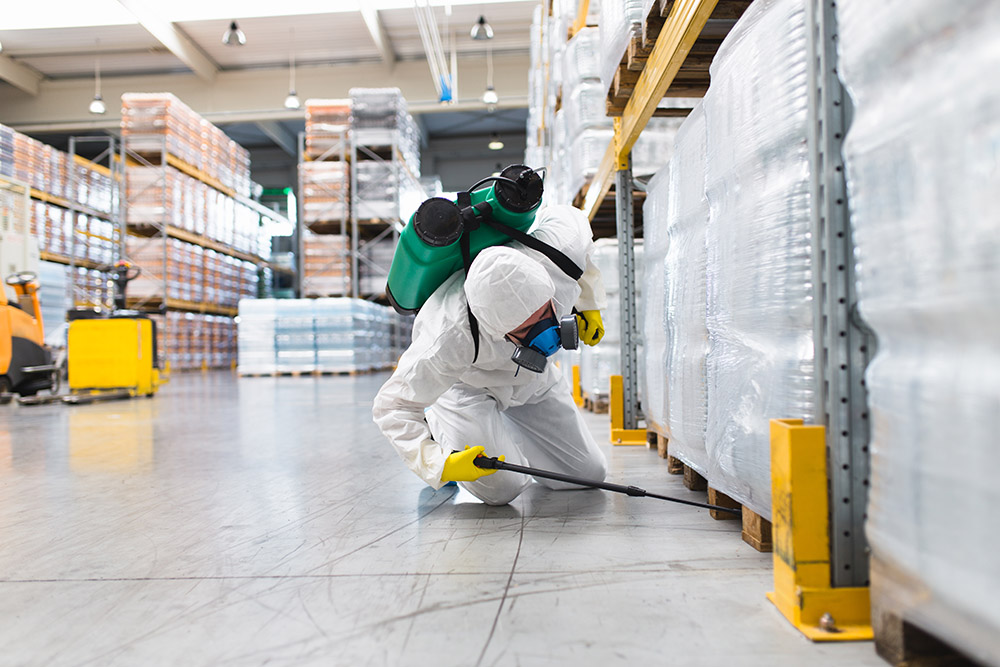Trustworthy Pest Control Auckland: Specialist Elimination and Avoidance
Wiki Article
Recognizing Various Sorts Of Bug Control Approaches and Their Performance
When thinking about bug control approaches, it is vital to understand the diverse techniques readily available and their varying levels of effectiveness. By checking out the subtleties of these parasite control methods, an extensive understanding of just how to address pest concerns can be created.Chemical Pest Control Approaches
Chemical bug control techniques play a pivotal role in effectively handling and getting rid of pest infestations in different settings. These techniques involve the usage of chemical compounds to get rid of or hinder bugs such as bugs, weeds, and rats. Among the key benefits of chemical bug control is its capacity to provide quick and targeted services to pest troubles. By using particular chemicals that are designed to target particular parasites, this method can aid protect against damages to plants, structures, and human health.However, it is important to consider the potential threats and disadvantages linked with chemical parasite control approaches. Overreliance on chemicals can cause the growth of pesticide resistance in insects, making them tougher to manage over time. Furthermore, making use of specific chemicals can have damaging results on non-target organisms, the atmosphere, and human health if not applied correctly.

Biological Bug Control Methods
Making use of all-natural killers and microorganisms to handle parasite populaces properly, biological parasite control techniques provide a lasting and environment-friendly approach to pest monitoring. By advertising the task or presenting of organisms that naturally take advantage of or contaminate parasites, such as ladybugs for aphid control or particular germs for caterpillar problems, biological control can assist keep parasite populations at convenient degrees without the need for artificial chemicals. This approach is especially useful for organic farming practices, as it stays clear of making use of potentially unsafe materials while maintaining plant wellness.
Physical Bug Control Approaches
While organic bug control techniques concentrate on taking advantage of all-natural predators and microorganisms, physical bug control techniques utilize mechanical and physical obstacles to manage parasite populaces. These techniques are often considered eco-friendly as they lessen using chemicals. Physical pest control includes strategies such as capturing, using obstacles like nets or displays, and physically removing pests from the area.Catches are frequently made use of in physical bug control to capture and get rid of insects like pests and rodents. These catches can be baited with food or pheromones to bring in the bugs, leading them to an included location where they can be easily disposed of. One more physical approach is the use of obstacles such as fencings, nets, or screens to navigate to this site avoid pests from getting in or infesting certain locations. Mounting great mesh screens on windows can assist maintain out flies and mosquitoes. Pest Control Auckland.
All-natural Insect Control Methods
Including plant-based repellents and natural predators is a vital method in executing effective natural insect control techniques. By urging the visibility of helpful pests like ladybugs, lacewings, or predatory termites, garden enthusiasts can normally control pest populaces. These killers feed on typical garden parasites such as caterpillars, aphids, and mites, aiding to preserve a well balanced community without the need for chemical treatments.
Furthermore, applying social practices such as plant rotation, companion growing, and preserving appropriate plant health and wellness can also boost the effectiveness of natural pest control approaches. These strategies not just help in avoiding insect invasions however additionally advertise biodiversity and overall community resilience. By integrating these all-natural strategies, individuals can successfully handle insects while decreasing ecological influence.
Integrated Insect Administration (IPM) Approach
Carrying Out an Integrated Pest Management (IPM) technique is essential for successfully regulating parasite populations while decreasing reliance on chemical pesticides. IPM is a sustainable and detailed strategy that integrates numerous pest control techniques to attain long-lasting remedies. This method concentrates on prevention, control, and monitoring to attend to parasite concerns in an environmentally friendly way.web IPM incorporates organic, social, physical, and mechanical strategies with the limited and tactical usage of chemicals when necessary. By highlighting positive procedures such as environment alteration, biological control, and exclusion, IPM intends to reduce pest populations and their effect on the ecosystem. Regular monitoring is important in IPM to examine bug degrees properly and figure out the most appropriate control methods.
Among the vital benefits of IPM is its capability to lessen the dangers connected with excessive pesticide use, such as ecological contamination and damage to non-target organisms. Additionally, IPM advertises a much more alternative method to pest management by taking into consideration the total environment dynamics. In general, the IPM approach supplies a reliable and sustainable option for insect control while promoting ecological duty.
Final Thought
Finally, understanding the various sorts of bug control techniques and their efficiency is important in successfully handling pest problems. Chemical, organic, physical, and natural pest control approaches each have their very own advantages and restrictions. Integrated Insect Management (IPM) strategy, which incorporates numerous methods for lasting pest control, is significantly being recognized as a all natural and eco-friendly option. By utilizing a mix of these methods, companies and individuals can successfully regulate pests while lessening harm to the atmosphere.Chemical insect control approaches play a crucial role in effectively managing and eliminating pest invasions in numerous settings.Making use of all-natural killers and virus to take care of pest populaces properly, organic parasite control approaches use a lasting and green strategy to pest administration. By promoting the task or description presenting of organisms that naturally prey on or infect insects, such as ladybugs for aphid control or specific germs for caterpillar invasions, biological control can help keep parasite populaces at workable levels without the need for artificial chemicals.While organic bug control methods focus on taking advantage of all-natural predators and pathogens, physical pest control approaches use mechanical and physical barriers to take care of bug populations. Integrated Pest Monitoring (IPM) technique, which integrates numerous techniques for sustainable parasite control, is increasingly being identified as a alternative and ecologically friendly remedy.
Report this wiki page